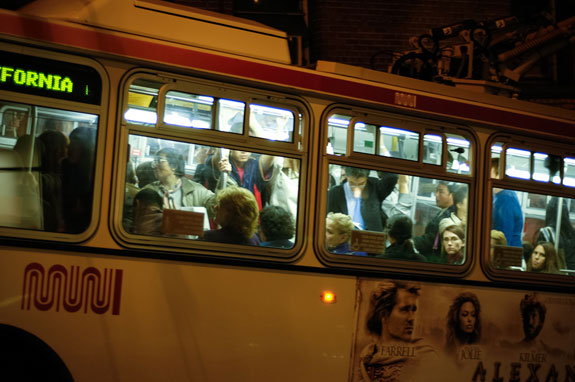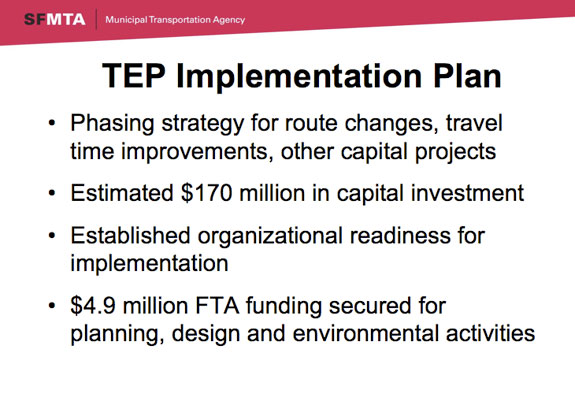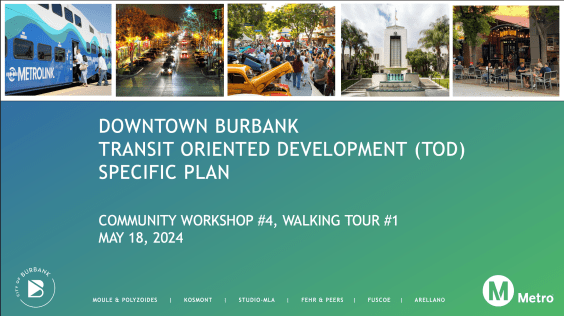San Francisco Mayor Ed Lee, in an interview with Streetsblog this week, pledged to make the Transit Effectiveness Project (TEP) implementation his number one Muni priority. That'll be no easy task, however. More than three years after the SFMTA Board unanimously approved a plan to give Muni its first major revamp in 20 years, the TEP -- at a cost of over $3 million so far -- remains just another plan collecting dust.
SFMTA staffers who worked on the TEP examined what's wrong with Muni and what needs to be done to turn it into a more efficient transit system. It was adopted after an ambitious process of gathering ridership data and community input and considered best practices at other transit agencies.
The goals to dramatically improve service and reliability focus on Muni's busiest corridors. Recommendations include establishing networks of faster routes, restructuring routes and expanding limited-stop service, among other improvements, to shave delays and increase speed. So far, though, it's only been used to inform the process for making service cuts and restorations.
The two major obstacles to quick implementation are California Environmental Quality Act (CEQA) review and a detailed funding strategy. Add political will as the third. If Mayor Lee is serious about implementing the TEP, he will have to direct the SFMTA and other city departments to move immediately to expedite the process, including major environmental analysis.
"He needs to tell the SFMTA executive director (Nat Ford) to implement the TEP immediately and that he will take the heat for any public push back on its elements," said transit advocate Dave Snyder, who is also a member of the Golden Gate Bridge District Board of Directors.
Ford, who is now looking to leave the agency, has a record of moving slowly on bold actions unless he is directed to do so by the Mayor's Office. Some transit advocates said the SFMTA Board of Directors and the Board of Supervisors should also step up to the plate, and put pressure on the agency.
So far, the SFMTA -- which is still internally debating what parts of the TEP it wants to move forward on -- hasn't submitted it to the Planning Department for environmental review. Sources say the city is nervous and wants to take a careful route in light of the bicycle injunction fiasco but the time frame being talked about inside the agency for environmental review is two years. That's quite a delay for hundreds of thousands of Muni riders desperate to see the transit agency turned around.
"I think it's an utter failure of our administrators at the SFMTA and at the Planning Department who do the environmental analysis that it takes so long," said Snyder. "It's not what CEQA was meant to do, which is subject transit improvements to two years of delay."
The SFMTA has been distracted by budget woes, but as Livable City's Tom Radulovich points out, the TEP will ultimately help pull the agency out of the red.
"One of the only ways to get out of their operating budget hole is to make their service faster and more reliable, and the TEP is the way to do that. So, the TEP is actually essential to their operating budget rather than cutting and cutting and cutting," said Radulovich.
Last week, SFMTA Transit Director John Haley gave this Power Point presentation [pdf] to the SFMTA Board of Directors but it offered no real update on where the TEP stands and when we could actually see implementation. Asked for an official response, SFMTA spokesperson Paul Rose sent the following statement:
We remain committed to our objective to implement the TEP and develop a roadmap that will transform Muni service and better meet customer demand. The findings proved that the 15 busiest corridors account for 75 percent of Muni boardings and the vast majority of our customers would benefit from shifting resources from very low ridership routes to the most crowded routes. Going forward, we will continue to work on reliability initiatives; review existing stop spacing and all door boarding; continue to implement environmental analysis; and develop detailed design of travel time improvements and other needed capital improvements.
Mayor Lee himself expressed frustration in our interview that it "takes such a long time to make these improvements," but he agreed that TEP has to be "implemented all the way." How soon before the Mayor can force the SFMTA to act remains an open question, but one that can't wait any longer.






